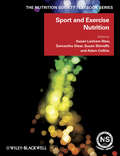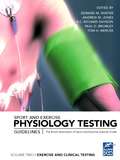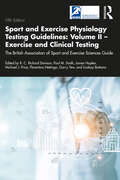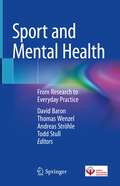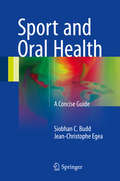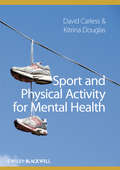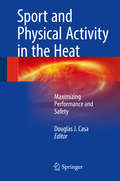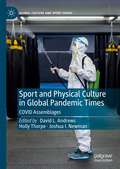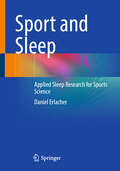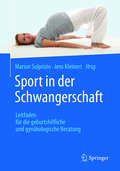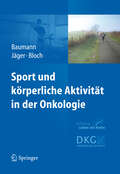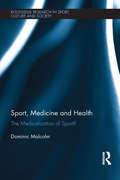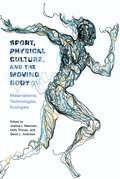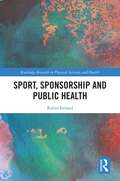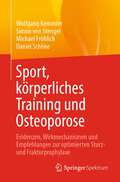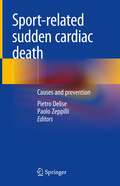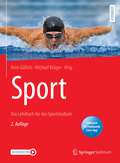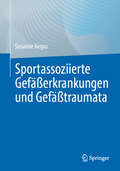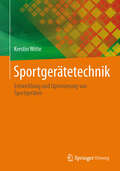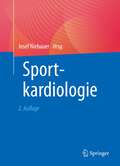- Table View
- List View
Sport and Exercise Nutrition (The Nutrition Society Textbook #8)
by Susan A Lanham-New Samantha J Stear Susan M Shirreffs Adam L CollinsPlease note that digital editions do not include all the illustrations found in the printed book. Now widely adopted on courses throughout the world, the prestigious Nutrition Society Textbook series provides students with the scientific basics in nutrition in the context of a systems and disease approach rather than on a nutrient by nutrient basis. In addition books provide a means to enable teachers and students to explore the core principles of nutrition and to apply these throughout their training to foster critical thinking at all times. This NS Textbook on Sport and Exercise Nutrition has been written to cover the latest information on the science and practice of sport and exercise nutrition. A key concept behind this textbook is that it aims to combine the viewpoints of world leading nutrition experts from both academia/research and a practical stand point. Plus where necessary there are additional practitioner based authors to ensure theory is translated into practice for each chapter in the form of either ‘practice tips' or ‘information sheets' at the end of relevant chapters. The textbook in essence can be divided into three distinct but integrated parts: Part 1: covers the key components of the science that supports the practice of sport and exercise nutrition including comprehensive reviews on: nutrients both in general and as exercise fuels; exercise physiology; hydration, micronutrients; and supplements. Part 2: moves into focusing on specific nutrition strategies to support different types of training including: resistance; power/sprint; middle distance/speed endurance; endurance; technical/skill, team; and specific competition nutrition needs. The unique format of this textbook is that it breaks down nutrition support into training specific as opposed to the traditional sport specific support. This reflects the majority of current sport and exercise requirements of the need to undertake concurrent training and therefore facilitating targeted nutrition support to the different training components through the various macro and micro training cycles. Part 3: explores some of the practical issues encountered in working in the sport and exercise nutrition field and includes key sport related topics such as: disability sport; weight management; eating disorders; bone and gut health; immunity; injury; travel; and special populations and situations. READERSHIP: Students of nutrition and dietetics at both undergraduate and postgraduate level. All those working in the field of nutrition and related health sciences.
Sport and Exercise Physiology Testing Guidelines: The British Association of Sport and Exercise Sciences Guide
by Andrew M. Jones Edward M. Winter R.C. Richard Davison Paul D. Bromley Tom MercerSport and exercise physiologists are called upon to carry out physiological assessments that have proven validity and reliability, both in sport-specific and health-related contexts. A wide variety of test protocols have been developed and refined. This book is a comprehensive guide to these protocols and to the key issues relating to physiological testing. Volume I will cover sport-specific testing, and Volume II clinical and exercise testing. With contributions from many leading specialist physiologists, and covering a wide range of mainstream sports, special populations, and ethical, practical and methodological issues, these volumes represent an essential resource for sport-specific and clinical exercise testing in both research and applied settings. Visit the companion website at www.routledgesport.com/bases
Sport and Exercise Physiology Testing Guidelines: The British Association of Sport and Exercise Sciences Guide
by James Hopker R. C. Richard Davison Paul M. Smith Michael J. Price Florentina Hettinga Garry Tew Lindsay BottomsSince its first published edition more than 30 years ago, the BASES (British Association of Sport and Exercise Sciences) Physiological Testing Guidelines have represented the leading knowledge base of current testing methodology for sport and exercise scientists. Sport and exercise physiologists conduct physiological assessments that have proven validity and reliability, both in laboratory and sport-specific contexts. A wide variety of test protocols have been developed, adapted and refined to support athletes of all abilities reach their full potential. This book is a comprehensive guide to these protocols and to the key issues relating to physiological testing. With contributions from leading specialist sport physiologists and covering a wide range of mainstream sports in terms of ethical, practical and methodological issues, this volume represents an essential resource for sport-specific exercise testing in both research and applied settings. This new edition draws on the authors’ experience of supporting athletes from many sports through several Olympic cycles to achieve world leading performances. While drawing on previous editions, it is presented in a revised format matching the sport groupings used in elite sport support within the UK sport institutes. Building on the underpinning general procedures, these specific chapters are supported by appropriate up-to-date case studies in the supporting web resources.
Sport and Mental Health: From Research to Everyday Practice
by David Baron Thomas Wenzel Andreas Ströhle Todd StullThis user-friendly, comprehensive and highly relevant book allows readers to gain a better understanding of mental health issues in sport and exercise. The field of sports psychiatry continues to grow globally at a rapid pace. This, in part, can be explained by the changing culture of sport leading to an appreciation of the role of psychiatric symptoms and syndromes in the world of sport, but also the increasing spread of both highly performance oriented and grass-roots basic sports and the associated risks in large sections of the population. The long-standing stigma attached to mental health problems, such as depression, anxiety, ADHD, suicide, brain injuries, substance-abuse, is being challenged not only by high-profile athletes, but also in public health and general mental health services. The book utilizes an innovative case-based and structured didactical format to provide short summaries of recent research by leading experts in the respective fields, as well as up-to date prevention and clinical guidelines for all relevant disorders in a way that is easily accessible to the large and growing groups interested and active in sports. This work is relevant for all mental health professionals and can also be used by a wider readership including medical doctors, psychologists, athletes and coaches. A second volume covers the role of exercise as an effective treatment for a number of common psychiatric conditions, such as depression, anxiety, eating disorders and substance abuse.
Sport and Oral Health
by Siobhan C. Budd Jean-Christophe EgeaThis book aims to explore the intricate interrelationship between oral health and sport, with the focus on highly popular team games, endurance sports, and explosive events. In order to understand the vulnerability of athletes of all levels of ability to oral health problems, relevant aspects of sports physiology and training are outlined, as are the predisposing behavioral, psychological, and physiological elements. Specific sports-related oral risk factors are identified and detailed, and the dental conditions frequently observed in athletes are explained. The dental clinical reality of athletes reveals a wide spectrum of oral consequences, affecting both soft and hard tissues, that can adversely impact on training and competitiveness. Principles of dental management are highlighted, and therapeutic solutions provided for the most common dental lesions. Emphasis is placed on preventative measures and solutions adapted to the athlete's individual needs, as well as the importance of effective collaboration with a diverse team of professionals. The book will be of interest to dentists, health professionals, sports coaches, athletes, and teachers and students of dentistry and medical disciplines.
Sport and Physical Activity for Mental Health
by Kitrina Douglas David CarlessWith approximately 1 in 6 adults likely to experience a significant mental health problem at any one time (Office for National Statistics), research into effective interventions has never been more important. During the past decade there has been an increasing interest in the role that sport and physical activity can play in the treatment of mental health problems, and in mental health promotion. The benefits resulting from physiological changes during exercise are well documented, including improvement in mood and control of anxiety and depression. Research also suggests that socio-cultural and psychological changes arising from engagement in sport and physical activity carry valuable mental health benefits. Sport and Physical Activity for Mental Health is an evidence-based practical guide for nurses, allied health professionals, social workers, physical activity leaders, and sport coaches. The authors provide comprehensive analysis of a broad range of client narratives, integrating theory and the latest research to explore the effectiveness of various interventions. The book offers readers detailed recommendations, suggestions, and ideas as to how sport and physical activity opportunities can be tailored to provide the greatest mental health benefits.
Sport and Physical Activity in the Heat
by Douglas J. CasaThis unique book is the first of its kind to specifically explore the science, medicine, challenges and successful experiences of assisting those who must perform and thrive in hot conditions, with an eye toward maximizing both performance and safety. Beginning with both human and comparative physiology as it relates to coping with the heat, key concepts are subsequently elaborated, including heat acclimatization, work-to-rest ratios, hydration, sleep, the effects of altitude, and the use of drugs and supplements. The sections that follow discuss heat-related considerations in individual and team sports and other populations, monitoring techniques, and medical and legal issues.Athletes, warfighters and laborers are often forced to perform intense physical activity in the heat as a part of their jobs or lifestyle. The process of properly preparing for this challenge is multifaceted and often not fully understood or utilized. Sport and Physical Activity in the Heat is an excellent resource for team physicians, high-level coaches, serious athletes, athletic trainers, exercise scientists, strength and conditioning coaches, industrial hygienists, military commanders, or anyone involved in the process of maximizing performance and safety during exercise in the heat for the athlete, warfighter, or laborer.
Sport and Physical Culture in Global Pandemic Times: COVID Assemblages (Global Culture and Sport Series)
by David L. Andrews Holly Thorpe Joshua I. NewmanThis book provides a definitive and comprehensive contribution to the expanding body of research related to sport/physical culture and the COVID-19 global pandemic. By examining the generative complexities that simultaneously link and shape sport/physical culture and COVID, the book develops a collection of multi-faceted readings. The anthology is framed by an ontological understanding prefigured on relationality, liminality, and perpetual becoming. The contributions theoretically, methodologically and representationally explore COVID-sport assemblages as a dynamic and diverse “ad hoc grouping”of interpenetrating affecting elements, encompassing material and expressive forms, human and non-human, animate and inanimate matter. The book will be of interest to advanced undergraduate and students and scholars of kinesiology, sociology of sport, critical studies of the body, physical education, sport and social issues, public health, physical cultural studies, sociology, foreign policy studies, and international studies.
Sport and Sleep: Applied Sleep Research for Sports Science
by Daniel ErlacherAt first glance, sport and sleep appear to be two topics that could hardly be more different: Physical and mental peak performance on the one hand - inactivity and unconsciousness on the other. This book is dedicated to this new issue and uses various examples from sports practice to show that there are numerous points of contact here. A theoretical section at the beginning introduces the basics of sports science and sleep research, while the much larger section is dedicated to its application in a sporting environment. Among other things, the sleep behaviour of athletes is presented, including how jet lag in sport and sleep deprivation can become noticeable before sporting performances and competitions. It also deals with the dream experience of motorised actions and training in lucid dreams. The book is aimed at those interested in sports science, sleep medicine, psychology and neurology, as well as trainers and sports enthusiasts who would like to read up on the subject in moredetail.
Sport in Kultur und Gesellschaft: Handbuch Sport und Sportwissenschaft
by Michael Krüger Dieter Hackfort Eike Emrich Freya Gassmann Christian PierdziochDieses Handbuch bietet einen kompletten Überblick über die zentralen Themen der Sozialwissenschaften im Sport. Es richtet sich an das breite Publikum der Fachleute, Lehrenden und Wissenschaftler*innen in Sport und Sportwissenschaft. Hier können Sie sich kompakt und kompetent über den Stand der Wissenschaft zur Kultur des Sports informieren. Das Handbuch ersetzt bisherige Lexika und Handbücher zum Sport. Die Texte sind verständlich formuliert und anschaulich aufbereitet. Die knapp 50 Kapitel in diesem Band geben Ihnen den aktuellsten wissenschaftlichen Stand über die ökonomischen, sozialen, kulturellen, politischen, rechtlichen, pädagogischen und psychologischen Zusammenhänge des Sports. Zudem erhalten Sie Hinweise auf die wichtigste nationale und internationale Forschungsliteratur. Die Herausgeber: Arne Güllich ist Professor für Sportwissenschaft und leitet das Fachgebiet Sportwissenschaft an der TU Kaiserslautern. Er forscht in den Bereichen Jugendsport, Talententwicklung, Training und Förderstrukturen. Güllich hat zuvor im Deutschen Olympischen Sportbund als Leiter der Stabsstelle Grundsatzfragen gearbeitet. Praxiserfahrungen hat er als Trainer vom Jugendbereich bis zu den Olympischen Spielen gesammelt. Michael Krüger ist Professor für Sportwissenschaft an der Westfälischen Wilhelms-Universität zu Münster. Seine Forschungsschwerpunkte liegen im Bereich der Sportpädagogik und -geschichte, der wissenschaftstheoretischen Grundlagen der Sportwissenschaft, der olympischen Geschichte und Erziehung sowie von ethischen und pädagogischen Fragen des Sports. Er ist Verfasser und Herausgeber zahlreicher wissenschaftlicher Arbeiten zum Sport sowie mehrerer Lehr- und Handbücher zur Sportwissenschaft und Sportpädagogik.
Sport in der Schwangerschaft: Leitfaden für die geburtshilfliche und gynäkologische Beratung
by Marion Sulprizio Jens KleinertDieses Buch richtet sich an Alle, die sich mit der Beratung und Betreuung zum Thema „Sport in und nach der Schwangerschaft“ differenzierter auseinander setzen wollen. Hierzu bietet es ein fundiertes Wissen, um Schwangere optimal zu betreuen, zu beraten oder zu begleiten. Das Buch gibt einen Überblick über die Grundlagen von sportbezogener Beratung in der Schwangerschaft und beschreibt die Auswirkungen von Bewegung auf den mütterlichen und fetalen Organismus sowie die Effekte auf Psyche und Wohlbefinden. Weiterhin gibt der Leitfaden konkrete Trainingsempfehlungen auf Basis der aktuellen Studienlage, informiert zu Kontraindikationen und geht auf spezielle Themen wie beispielsweise Risikoschwangerschaft und Beckenboden ein.
Sport in der Schwangerschaft: Leitfaden für die geburtshilfliche und gynäkologische Beratung
by Marion Sulprizio and Jens KleinertDieses Buch richtet sich an Alle, die ihre schwangere Patientin hinsichtlich sportlicher Betätigung beraten. Es gibt einen Überblick über die Auswirkungen von Bewegung auf den mütterlichen und fetalen Organismus und die Effekte auf Psyche und Wohlbefinden.Weiterhin gibt der Leitfaden konkrete Trainingsempfehlungen auf Basis der neuesten Studienlage, informiert über Kontraindikationen und geht auf spezielle Themen wie beispielsweise Risikoschwangerschaft und Beckenboden ein.
Sport und Schlaf: Angewandte Schlafforschung für die Sportwissenschaft
by Daniel ErlacherSport und Schlaf scheinen auf den ersten Blick zwei Themen, die unterschiedlicher kaum sein können: Körperliche sowie mentale Höchstleistungen auf der einen Seite – Inaktivität und Bewusstlosigkeit auf der anderen. Dieses Buch widmet sich diesem neuen Sachverhalt und zeigt anhand unterschiedlicher Beispiele aus der Sportpraxis, dass es hier zahlreiche Anknüpfungspunkte gibt. Ein theoretischer Teil führt zu Beginn in die Grundlagen der Sportwissenschaft und Schlafforschung ein, der weitaus größere Teil widmet sich der Anwendung im sportlichen Umfeld. Unter anderem wird das Schlafverhalten von Athletinnen und Athleten vorgestellt, wie sich Jet Lag im Sport und Schlafdeprivation vor sportlichen Leistungen als auch vor Wettkämpfen bemerkbar machen kann. Ebenso werden das Traumerleben von motorischen Handlungen sowie das Training im Klartraum behandelt. Das Buch richtet sich an Interessierte aus der Sportwissenschaft, Schlafmedizin, Psychologie, Neurologie, aber auch an Trainer und Trainerinnen, sowie an sporttreibenden Personen, die sich hier fundierter einlesen möchten.
Sport und körperliche Aktivität in der Onkologie
by Freerk Baumann Wilhelm Bloch Elke JägerDie positive Wirkung von Sport in der Krebsprävention ist bekannt. Doch auch bei Tumorpatienten, das belegen Studien, mindert Bewegungstraining die Symptome des Fatigue-Syndroms, verbessert das psychische Befinden und erhöht die Lebensqualität. Die Spezialisten des Herausgeber- und Autorenteams vermitteln praxis- und forschungssrelevantes Wissen zum Thema Krebserkrankung und Sport: vom Ausdauer- und Krafttraining, den Möglichkeiten der ärztlichen Verordnung von Bewegung bis hin zu den Einschränkungen bei den unterschiedlichen Behandlungsformen.
Sport, Medicine and Health: The medicalization of sport? (Routledge Research in Sport, Culture and Society)
by Dominic MalcolmThe relationship between sport, medicine and health in our society is becoming increasingly complex. This important and timely study explores this relationship through an analysis of changing political economies, altered perceptions of the body and science’s developing contribution to the human condition. Surveying the various ways in which medicine interacts with the world of sport, it examines the changing practices and purposes of sports medicine today. Drawing on the latest research in the sociology of sport, this book investigates the scientific discourse underlying the promotion of physical activity to reveal the political context in which medical knowledge and public policies emerge. It considers the incongruities between these policies and their attempts to regulate the supply of and demand for sports medicine. Through a series of original case studies, this book exposes the social construction of sports medical knowledge and questions the potential for medicine to influence athletes’ well-being both positively and negatively. Sport, Medicine and Health: The medicalization of sport? provides valuable insights for all students and scholars interested in sports medicine, sports policy, public health and the sociology of sport.
Sport, Physical Culture, and the Moving Body: Materialisms, Technologies, Ecologies (Critical Issues in Sport and Society)
by David Andrews Samantha Frost Simone Fullagar Mary Louise Adams Samantha King Pirkko Markula Michael D. Giardina Matthew G. Hawzen Oliver Rick Jacob J. Bustad Richard Pringle Mary G. McDonald Kiri Baxter Douglas Booth Kyle S Bunds Mariana Clark Simon C Darnell Jennifer Sterling Christopher McLeod Shannon Leigh Jette Katelyn Esmonde Carolyn Pluim Gavin WeedonThe moving body—pervasively occupied by fitness activities, intense training and dieting regimes, recreational practices, and high-profile sporting mega-events—holds a vital function in contemporary society. As the body moves—as it performs, sweats, runs, and jumps—it sets in motion an intricate web of scientific rationalities, spatial arrangements, corporate imperatives, and identity politics (i.e. politics of gender, race, social class, etc.). It represents vitality in its productive and physiological capacities, it drives a complex economy of experiences and products, and it is a meaningful site of cultural identities and politics. Contributors to Sport, Physical Culture, and the Moving Body work from a simple premise: as it moves, the material body matters. Adding to the burgeoning fields of sport studies and body studies, the works featured here draw upon the traditions of feminist theory, posthumanism, actor network theory, and new materialism to reposition the physical, moving body as crucial to the cultural, political, environmental, and economic systems that it constitutes and within which is constituted. Once assembled, the book presents a study of bodies in motion—made to move in contexts where technique, performance, speed, strength, and vitality not only define the conduct therein, but provide the very reason for the body’s being within those economies and environments. In so doing, the contributors look to how the body moving for and about rational systems of science, medicine, markets, and geopolity shapes the social and material world in important and unexpected ways. In Sport, Physical Culture, and the Moving Body, contributors explore the extent to which the body, when moving about both ostensibly active body spaces (i.e., the gymnasium, the ball field, exercise laboratory, the track or running trail, the beach, or the sport stadium) and those places less often connected to physical activity (i.e. the home, the street, the classroom, the automobile), is bounded to technologies of life and living; and to the political arrangements that seek to capitalize upon such frames of biological vitality. To do so, the authors problematize the rise of active body science (i.e. kinesiology, sport and exercise sciences, performance biotechnology) and the effects these scientific interventions have on embodied, lived experience. Contributors to Sport, Physical Culture, and the Moving Body will be engaging a range of new and emerging theoretical perspectives, including new materialist, political ecology, developmental systems theory, and new material feminist approaches, to examine the actors and assemblages of movement-based material, political, and economic production. In so doing, contributors will vividly and powerfully illustrate the extent to which a focus on the fleshed body and its material conditions can bring forth new insights or ontological and epistemological innovation to the sociology of sport and physical activity. They will also explore the agency of the body as and amongst things. Such a performative materialist approach explicates how complex assemblages of sport and physical activity—bringing into association everything from muscle fibers and dietary proteins to stadium concrete or regional aquifers—are not only meaningful, but ecological. By focusing on the confluence of agentive materialities, disciplinary technologies, vibrant assemblages, speculative realities, and vital performativities, Sport, Physical Culture, and the Moving Body promises to offer a groundbreaking departure from representationalist tendencies and orthodoxies brought about by the cultural turn in sport and physical cultural studies. It brings the moving body and its physics back into focus: recentering moving flesh and bones as locus of social order, environmental change, and the global political economy.
Sport, Sponsorship and Public Health (Routledge Research in Physical Activity and Health)
by Robin IrelandThis book examines the development of sport sponsorship and its impact on global public health. It argues that sport governing bodies should not continue to treat fans solely as consumers, and that a more ethical approach should be taken to sport sponsorship. Drawing on research from sport studies, marketing and public health, the book presents a brief history of advertising and marketing in sport, including the importance of tobacco in the development of sport sponsorship, before exploring key aspects of the contemporary relationship between sport and corporate sponsors, including mega-events, digital technologies and brand engagement. It offers an in-depth case study of sponsorship in the English Premier League – one of the world’s most successful sporting properties – before considering how sport might be better regulated, now and in the future, to better protect the interests of fans and other stakeholders from a health perspective. The book features a number of insightful images showcasing sport sponsorship in connection with tobacco, mega-events, alcohol, junk food and drink, and gambling over the years. Addressing a topical and hugely important issue, this is important reading for students, researchers, practitioners and policy makers with an interest in sport business and management, the ethics of sport, physical activity and health, event studies, marketing or public health.
Sport, körperliches Training und Osteoporose: Evidenzen, Wirkmechanismen und Empfehlungen zur optimierten Sturz- und Frakturprophylaxe
by Michael Fröhlich Wolfgang Kemmler Simon von Stengel Daniel SchöneDieses Fachbuch versteht sich als umfassende, strikt evidenzbasierte und praxisbezogene Orientierung und Handlungsempfehlung rund um den Themenkomplex „Bewegung, Sport und körperliches Training zur Vermeidung von niedrig-traumatischen Frakturen“. Besonderes Augenmerk liegt auf folgenden Aspekten:Relevanz eines körperlichen Trainings innerhalb der FrakturprophylaxeStrategien zur Frakturprophylaxe durch Sport und körperliches TrainingHandlungsempfehlungen für ein körperliches Training zur FrakturprophylaxeKontraindikationen und VorsichtsmaßnahmenBewegungsangebote im Spannungsfeld von Osteoporose, Sturz- und FrakturprophylaxeDie Inhalte des Buchs wurden verständlich und nachvollziehbar aufbereitet, um unterschiedliche Adressaten bestmöglich anzusprechen. Neben medizinischen Berufsgruppen und Fachkräften im Gesundheits-, Präventions- und Rehabilitationssport möchten die Autoren besonders Menschen die durch Osteoporose und/oder erhöhter Sturzneigung von niedrig-traumatischen Frakturen bedroht oder betroffen sind, diese Publikation empfehlen.
Sport- und Gesundheitstourismus 2030: Wie die „Generation plus“ den Markt verändert
by Pamela Heise Michaela Axt-GadermannDieses Fachbuch fokussiert auf das sport- und gesundheitstouristische Nachfrageverhalten der "Generation plus". Einer Konsumentengruppe in ihrer zweiten Lebenshälfte, die mit einer großen Neugier in Bezug auf sich selbst und die Welt und einem Plus an Interessen, Anspruch und Kaufkraft ausgestattet ist. Durch die sich wandelnden soziodemographischen, ökonomischen und klimatischen Rahmenbedingungen ergeben sich auch im Bereich der Freizeit- und Tourismusbranche signifikante Änderungen zu den bisherigen Nachfrage- und Angebotsstrukturen. Destinationen, die sich bereits jetzt mit der wachsenden Zahl reifer Touristen beschäftigen, stellen ihre Weichen in Richtung Zukunft.Das Buch greift vor dem Hintergrund des demographischen Wandels aktuelle touristische Entwicklungen und zukünftige Herausforderungen auf, denen sich Destinationen und Anbieter im Sinne der Wettbewerbsfähigkeit stellen müssen. Das Buch richtet sich durch die Symbiose aus Theorie und Praxis im Sinne eines Handlungsleitfadens u.a. an Entscheider und Produktentwickler im touristischen Destinations- und Eventkontext, an Lehrende und Studierende sowie an alle, die eine anregende Lektüre suchen.
Sport-related sudden cardiac death: Causes and prevention
by Pietro Delise Paolo ZeppilliSudden death in athletes is a global problem. Although it is a relatively rare phenomenon (1/100,000 persons), when it does occur, it is often as an incomprehensible event. In fact, it strikes subjects who presumably should be much healthier than the general population. In the previous 20 years, many authors have studied this problem in an attempt to understand the causes and prevent these events, and it has been determined that, in the vast majority of cases, athletes who die suddenly have an underlying heart disease (arrhythmogenic cardiomyopathy, hypertrophic cardiomyopathy, coronary anomalies, channelopathies, etc.).In most cases these diseases do not produce major symptoms and do not preclude sports activity even at the highest levels, although they do increase the incidence of sudden death. How to discover these diseases in asymptomatic athletes is a hotly debated issue. In particular, there is controversy as to whether all athletes should undergo detailed medical screening, including electrocardiogram, or whether the costs of this screening are too high in relation to the event incidence. The purpose of this book is to accurately analyze the causes of sudden death in athletes and to provide cardiologists and sports physicians with useful tips on how to identify at-risk individuals.
Sport: Das Lehrbuch für das Sportstudium
by Martin LayDie vollständig überarbeite Neuauflage des Lehrbuchklassikers knüpft an das bewährte Konzept der Erstauflage an und umfasst alle wesentlichen Themenfelder und Inhaltsbereiche für ein erfolgreiches Sportstudium. Abseits einer grundlegenden Aktualisierung zeichnet sich die Folgeauflage insbesondere durch eine Vielzahl an digitalen Zusatzmaterialien aus. Für Studierende wird somit eine innovative Möglichkeit zur multimedialen Wissensvermittlung geschaffen, die weit über das geschriebene Buch hinausgeht. In diesem Lehrbuch erfahren Sie die aktuellen Erkenntnisse zu den vielfältigen Facetten des modernen Sports: Vom Schulsport über den Freizeit-, Breiten-, Fitness- und Gesundheitssport bis hin zum Wettkampf- und Spitzensport. Renommierte Expertinnen und Experten der Trainingswissenschaft, Medizin, Sozialwissenschaften und Pädagogik erklären die aktuelle Theorie und Praxis des Sports speziell für Ihr Sportstudium.Herausragende Merkmale sind:Verständliche Erklärungen von Fachkräften mit ausgiebiger PraxiserfahrungHervorhebung des Wichtigsten in prägnanten MerksätzenZahlreiche praktische Beispiele, Verbindung von Theorie und PraxisAnschauliche Darstellung mit ca. 400 farbigen Bildern und GrafikenUmfangreiches Glossar zum Nachschlagen von DefinitionenDigitale Übungsfragen zur Lernkontrolle und PrüfungsvorbereitungAbrufbare Videos für eine multimediale WissensvermittlungDas Lehrbuch Sport konzentriert sich auf die Inhalte der Bachelorstudiengänge mit Sportbezug. Nahezu alle Module des Bachelorstudiums finden sich in den Kapiteln wieder. Zusätzlich bietet es zentrale Grundlagen für die verschiedenen Sport-Masterstudiengänge, Fort- und Weiterbildungen von Sportlehrkräften und Sportfachpersonal in den vielfältigen Berufsfeldern sowie für den Leistungskurs Sport.
Sportassoziierte Gefäßerkrankungen und Gefäßtraumata
by Susanne RegusDas Buch fasst übersichtlich und praxisorientiert das Wissen über Gefäßerkrankungen und -verletzungen zusammen, die typischerweise bei Athletinnen und Athleten vorkommen. Dargestellt und erläutert werden ihre Pathogenese, Symptomatik, Diagnostik, Therapie und Prognose; konkret wird auf das Risiko ihres Auftretens bei einzelnen Sportarten hingewiesen. Der Band wendet sich somit an alle gefäß- oder sportmedizinisch tätigen Ärztinnen und Ärzte, aber auch an andere Berufsgruppen, die Sportlerinnen und Sportler betreuen und behandeln. Betroffen sind meist Menschen mit gesundem Gefäßsystem. Die chronisch stenosierenden sportassoziierten Erkrankungen, die vor allem bei der Ausübung von Ausdauersportarten auftreten, sind selten, mit der steigenden Beliebtheit eines aktiven Lebensstils ist aber mit ihrer Zunahme zu rechnen. Sportbedingte Verletzungen der Gefäße müssen häufig von unfallchirurgisch-orthopädischen Differenzialdiagnosen abgegrenzt werden. Beide sind von großer Bedeutung für die betroffenen Athletinnen und Athleten, und ihre zielführende Behandlung setzt die Kenntnis ihrer spezifischen Besonderheiten voraus.
Sportgerätetechnik
by Kerstin WitteDas Buch schlägt Lösungskonzepte zur Entwicklung und Optimierung von Sportgeräten und Sportausrüstungen vor. Dabei werden die besonderen physikalischen und biomechanischen Aspekte dieser Produkte berücksichtigt. Auch wird auf die unterschiedlichen Benutzergruppen eingegangen. Durch zahlreiche praktische Beispiele und die Erläuterung des methodischen Vorgehens erhält der Leser Anregungen für neue Produktentwicklungen als auch deren Evaluation im Bereich der Sportartikel. So wird es ihm möglich sein, Lösungen für sein konkretes Problem zu finden.
Sportkardiologie
by Josef NiebauerIn der Sportmedizin und Kardiologie gewinnt die Sportkardiologie zunehmend an Bedeutung mit den Bestrebungen eine Subspezialisierung zu etablieren. Derzeit ist sie in Lehre und Klinik jedoch unterrepräsentiert und Sportmedizinern und Kardiologen, die Sportler betreuen, stellen sich häufig sportkardiologische Fragen, auf die sie bisher keine Antworten finden. Dieses Buch will diese Lücke schließen, in dem es umfassend die Methoden der sportkardiologischen Untersuchungen vom EKG über die Spiroergometrie bis hin zum MRT beschreibt und unter anderem die Frage beanwortet, was Sportler mit kardiovaskulären Problemen tun dürfen. Der inhaltliche Bogen reicht von der Prävention kardialer Erkrankungen bis hin zu speziellen sportkardiologischen Aspekten im Rehabilitations-, Breiten- und Leistungssport. Geschrieben wurde es von Mitgliedern der Deutschen, Österreichischen. Schweizerischen und Europäischen Gesellschaften für Kardiologie und Sportmedizin.
Sportmedizin - Fragen und Antworten: 1000 Fakten für die Zusatzbezeichnung
by Christoph Raschka Björn KliemStehen Sie als Arzt kurz vor Ende der Zusatz-Weiterbildung oder wollen Sie in der Sportmedizin arbeiten?Dann können Sie Ihr Wissen mit diesem Taschenbuch optimal überprüfen! Über 1000 Fragen mit offenen und teilweise sehr ausführlichen Antworten bringen Sie auf den aktuellen Stand von Themen der Sportmedizin, wie z. B. Energiebereitstellung, Leistungsdiagnostik, Sportkardiologie, Sportorthopädie, Rehabilitation, Sporternährung, Höhenphysiologie, Tauchmedizin und vielem mehr. Mit diesem Buch können Sie sich systematisch und selbstständig auf die mündliche Abschlussprüfung vorbereiten. Die Fragen orientieren sich am Weiterbildungsinhalt der Zusatz-Weiterbildung Sportmedizin (WBO 2020) sowie dem (Muster-)Kursbuch Sportmedizin der BÄK. Die Fragen und Antworten wurden so formuliert, wie sie in einer mündlichen Prüfung vorkommen können bzw. sollten. So erhalten Sie Sicherheit bezüglich der Grundlagen der Sportmedizin, der spezifischen sportmedizinischen Aspekte, der Sportmedizin bei Erkrankungen und bezüglich der praktischen sportärztlichen Tätigkeit in der Praxis oder am Spielfeldrand.
